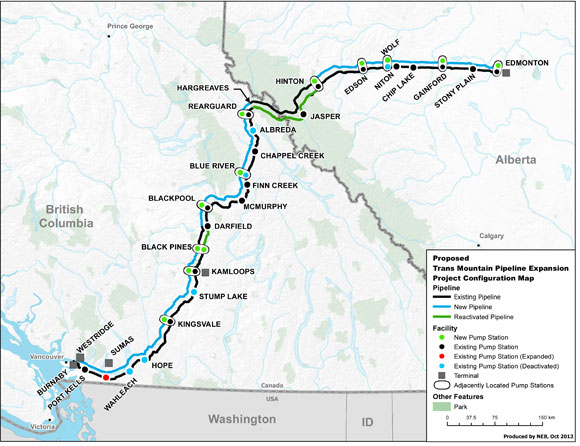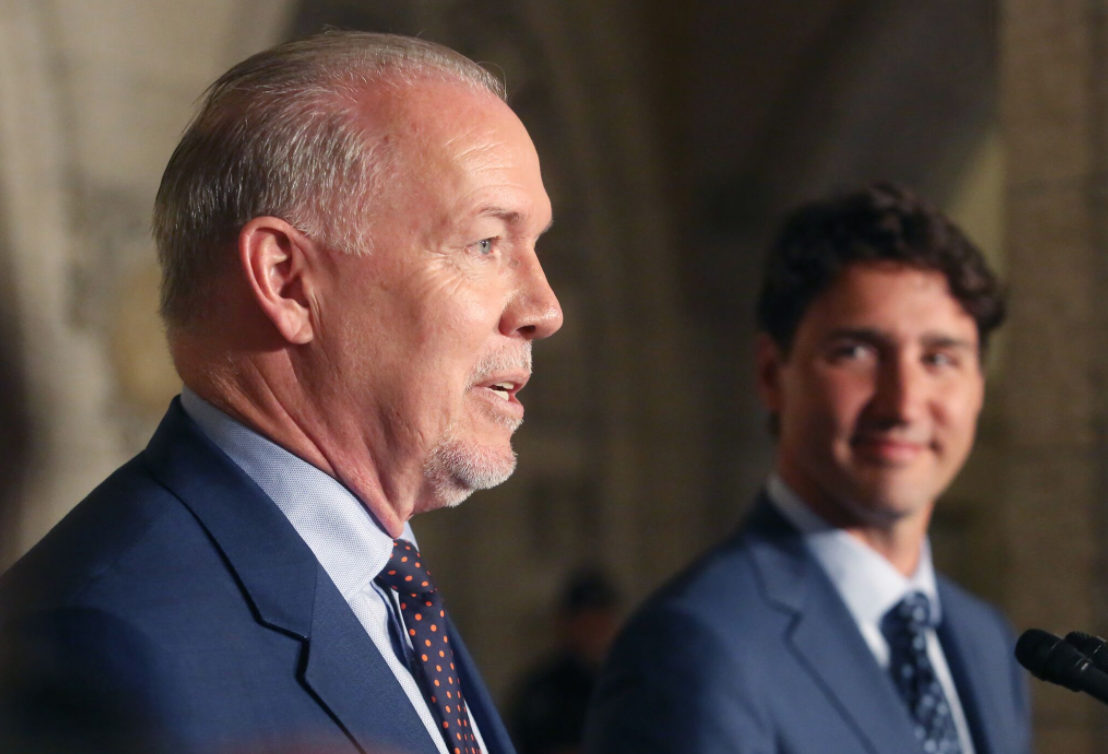Support strong Canadian climate journalism for 2025
The Trudeau government made an “unreasonable” legal mistake when it approved Kinder Morgan’s Trans Mountain pipeline expansion project, says a lawyer for B.C. Premier John Horgan's government.
In a weekend interview with National Observer, Monique Pongracic-Speier said that the federal government failed to provide evidence that it adequately considered all of the risks to the province of British Columbia when it gave a green light to the pipeline in November 2016.
Pongracic-Speier, from the Vancouver-based Ethos Law Group, made the comments as she and other lawyers prepared for seven days of hearings that start Monday to review a motion at the Federal Court of Appeal. The motion seeks to quash Prime Minister Justin Trudeau’s approval, in 2016, of the pipeline project.
The court will review legal challenges from several parties, including 10 First Nations, the municipalities of Vancouver and Burnaby, and environmental groups who are opposed to the project. The B.C. and Alberta governments both have status as interveners in the case.
If built, the Trans Mountain expansion would triple the capacity of an existing line, allowing it to transport up to 890,000 barrels of oil per day from Alberta to Burnaby, B.C. The pipeline would also lead to a significant increase in tanker traffic, which scientists say would threaten the survival of local populations of killer whales.
The case hits the courtroom just as the Texas-based energy giant behind the project warns that its construction schedule is in jeopardy. Late in September, the federal regulator, the National Energy Board (NEB), said that the company appeared to be breaking the law by deploying anti-spawning mats in streams along the pipeline route.
In a Sept. 22 letter to company president Ian Anderson, the regulator ordered Kinder Morgan Canada to stop this activity. But the company asked the NEB on Sept. 28 to make an exception to the rules, noting that the regulator frequently does this for companies upon request.
Their 'objective, of course, is to get oil to tankers'
But the NEB said on Friday that it would take the time it needs before making a decision that ensures protection for both the public and the environment.
Supporters of the project, including the Alberta government and the western province’s slumping oilsands industry, say pipeline expansion projects are the key to jobs and growth. Opponents, including Indigenous communities, environmentalists and municipalities along the proposed route say the pipeline would drive up Canada’s climate-warming pollution and lead to spills on land and in the water.
"The pipeline, of course, is not a pipeline to nowhere," Pongracic-Speier said. "The objective, of course, is to get oil to tankers, to export the oil to overseas markets."

B.C. Attorney General David Eby appointed Pongracic-Speier and Thomas Berger in August to represent the province's interests in the court case.
Pongracic-Speier suggested the increase in oil tanker traffic is why the project would pose risks to the British Columbia coast. And she explained that Trudeau’s government made a decision without providing enough evidence that it considered the extent of these impacts and risks.
“It’s important to note that under the National Energy Board Act, when the Governor in Council makes a decision of this kind... it has to give the reasons for its order in the order. And so looking to this (pipeline approval) order, we do not see consideration of this,” she said in the phone interview.
“So that, we say, is a legal error and it causes the Governor in Council (cabinet) decision to be unreasonable. And it’s important to be clear, I think, that what the Attorney General of B.C. is arguing in this case is it’s not about the interests of one province versus another. The point is that in making its decision about whether it’s in the public interest to issue the certificate, this risk, borne by British Columbia, has to be independently or separately considered.”
The following is an edited transcript of National Observer's interview with Pongracic-Speier. The interview was edited for length.

I guess what I'd like to know is, what is the Attorney General's strategy? And are you able to summarize what the main arguments will be this week?
Yes, I can certainly summarize what the Attorney General has to say in the proceedings, and maybe I can just back up from this week a little bit, to begin by saying that after the current government of British Columbia was elected, it decided to seek leave to intervene in proceedings that have been brought in the Federal Court of Appeal by 10 First Nations, as well as by the cities of Burnaby and Vancouver, and by two non-governmental organizations, the Living Oceans Society and the Raincoast Conservation Foundation.
In any event, all of these organizations, or municipalities, or First Nations were participants in the proceedings before the National Energy Board. And all of them brought petitions for judicial review of either the National Energy Board report and/or the order-in-council passed by the Federal Cabinet, which is technically in this context known as the Governor in Council, to direct the National Energy Board to issue a Certificate of Public Convenience and Necessity in relation to the Trans Mountain Project.
So that's the background. So the Attorney General decided to seek leave to intervene in the proceedings. The Attorney General of Alberta is also intervening. And leave was granted to the Attorney General of B.C. in late August, and our legal argument was filed on Sept. 1.
I should also say, just to be clear, that in addition to those parties challenging the decisions of the Governor in Council and/or the National Energy Board, in respect of its report, and with two interveners, there are as well parties that support the Trans Mountain Pipeline decision. And those would be Trans Mountain, as well as the Attorney General of Canada, and then the National Energy Board is also a party before these proceedings. It (the NEB) appears mainly to explain what happened before the National Energy Board.
So those are the circumstances. So the Attorney General of B.C. was granted leave to intervene, and then filed this written legal argument. And the focus of the Attorney General of British Columbia's submissions in that written argument, and the submissions that will be made orally in the Federal Court of Appeal this week, are on the decision of the Governor in Council to direct the National Energy Board to issue a Certificate of Public Convenience and Necessity.
And the gist of the argument is this: This pipeline project is an interprovincial pipeline, and interprovincial pipelines are matters that are within federal jurisdiction under the division of powers between the provinces and the federal government in our Constitution Act. So the federal level is a very important decision maker in this process.
There are, despite the fact that this is a federal decision, only two directly involved provinces. Alberta, where the pipeline starts, and British Columbia, where the pipeline terminates at the Westridge Marine Terminal. And the pipeline, of course, is not a pipeline to nowhere. The objective, of course, is to get oil to tankers, to export the oil to overseas markets.

So we say, in essence, that when the Governor in Council was exercising its discretion to determine whether this Certificate of Public Convenience and Necessity should be issued, it needed to consider the interests of both provinces. And if one has regard to the order-in-council that was passed, and that was passed at the end of November 2016, the order-in-council has a number of clauses to it that are recitals, or preambular in nature. And those are the paragraphs beginning "whereas."
And they set out the factors that the Governor in Council considered in making its decision. And having a look at those, there is acknowledgment that Trans Mountain applied for this Certificate of Public Convenience and Necessity for the proposed construction, and then the National Energy Board started proceedings and issued its report, and then there is reference to consultation and accommodation of the concerns of First Nations people. And that the Governor in Council accepts the board's recommendations that the project will not likely cause significant adverse environmental effects, under the Canadian Environmental Assessment Act.
And then there's reference to the Governor in Council having considered upstream greenhouse gas emissions associated with the project, and whether or not proceeding would be consistent with Canada's commitments in relation to the Paris Agreement on Climate Change. And then the Governor in Council says that it has also considered the ministerial panel report that was completed on the project after the National Energy Board proceedings.
And then the Governor in Council says, "And whereas the Governor in Council considers that the project would increase the access to markets for Canadian oil, and support environmentally sustainable resource development," and then it goes into the order that it makes.
Now, that last paragraph that I just read to you is a consideration of the province of Alberta's interests in developing its oil, and exporting that to markets overseas. But what the order-in-council does not indicate the Governor in Council considered is the risks of marine spills from project related shipping. And the Attorney General of B.C. says these are risks that will be borne by British Columbia, and British Columbians, pretty much alone.
And that's, of course, because the ships, when they leave the Westridge Marine Terminal, will thread through Burrard Inlet, go out into the Salish Sea, round the southern tip of Vancouver Island, travel through the Juan de Fuca Strait, and then into the Pacific, until they hit the 12-mile (19-kilometre) limit off the west coast of Vancouver Island. And all along that route, it's British Columbia that would bear the risk of a marine spill.

So the argument is essentially very simple, that the reasons of the Governor in Council, as set out in these recitals, do not indicate that this was given specific or independent consideration. And we say that that ought to have happened, because with only two provinces directly affected, this is a significant risk for British Columbia.
So the legal argument proceeds on the footing that this risk is disproportionate for this province. It needed to have independent consideration. And that the way we determine whether it did is by looking to the terms of the order-in-council. And it's important to note that under the National Energy Board Act, when the Governor in Council makes a decision of this kind, that whether a Certificate of Public Convenience and Necessity should be issued, it has to give the reasons for its order in the order. And so looking to this order, we do not see consideration of this.
So that, we say, is a legal error, and it causes the Governor in Council decision to be unreasonable. And it's important to be clear, I think, that what the Attorney General of B.C. is arguing in this case is it's not about the interests of one province versus another. The point is that in making its decision about whether it's in the public interest to issue the certificate, this risk, borne by British Columbia, has to be independently or separately considered.
And that risk has been recognized in other proceedings in the B.C. Supreme Court, in relation to the Northern Gateway, where that project was described as having a disproportionate impact on the interests of British Columbia. We say the same thing applies in relation to the Trans Mountain project. So that is, in essence, the argument. It's in most respects a fairly simple argument. The federal cabinet, in making this decision, had to consider this factor. The reasons don't disclose that it did so. And that's the essence of it.
So if they're able to produce the evidence showing that they did consider this, would that defeat the B.C. government's argument?
No. Because the thing is that under the terms of the National Energy Board Act, the Governor in Council has to set out its reasons for making its decision, and it has to consider all relevant factors. And we say that this is not only a relevant, but a highly-relevant factor. And so, if the reasons don't show that it was considered, then the order should be set aside, or the technical term in the law is quashed. If that were to happen, then the matter would be referred back to the cabinet for a new decision.

What's the timeline on this, in terms of evidence being presented and developments in these proceedings?
Well, as I say, it's not like a trial. So it's not as though the parties call evidence. So it's more like an appeal, in the sense that three judges of the Federal Court of Appeal are going to be sitting, starting on Monday, and the proceeding will be heard over seven days between next Monday and the following Friday. And they hear legal arguments from each of the parties, and from the two interveners about why the decision of the Governor in Council, and potentially the determination of the National Energy Board, why that is defensible at law. Or why it's not.
And so most of the First Nations applicants have arguments to make about insufficient consultation or accommodation of their particular interest, in their view. And then Raincoast Conservation and Living Oceans are particularly concerned with the impact of shipping on the southern area resident killer whale population — the orca population. And then the cities of Vancouver and Burnaby are concerned about the impact of the project, and/or project related shipping, on their communities.
So each will present its arguments, and then the Attorney General of Canada and Trans Mountain will present its arguments about why they think the decision was reasonable. And then the court will decide, based on an application of the law, in relation to the record. And as I say, the record was set many, many months ago.
Could anything that has happened in the past few weeks be relevant to this case? Could any of that be relevant in terms of the recent activities, construction activities, that Trans Mountain began doing in some streams, the subsequent order from the National Energy Board for them to stop, the fact that the number of actual watercourse crossings on the route of the pipeline seems to be uncertain or changing?
Are any of these issues that could be raised, do you think, in the next seven days?
Well, as I told you at the outset, all I can comment on is the submission that my client, the Attorney General of British Columbia, is making. And so those are other matters that I can't comment on.






Comments
"And then the Governor in Council says that it has also considered the ministerial panel report that was completed on the project after the National Energy Board proceedings." No one who considered that report could possibly approve the pipeline. This report concludes with six very serious questions that need to be answered, and they have not yet been answered.
The B.C.government must demonstrate that the promised choices available to citizens in democratic elections are real - above legal interpretation - where public health and safety are demonstrably at risk.
George Burrett